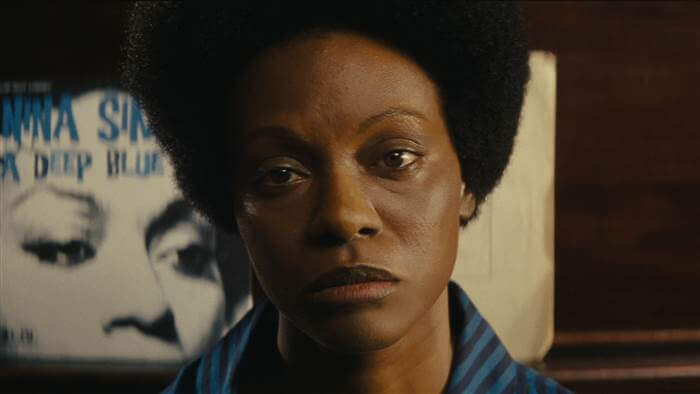‘Nina’ There’s a messy but fantastic, even sometimes profound new film in theaters about a legendary musician that doesn’t focus, as these things always do, on the halcyon days. Instead it skips to the latter years, when the work had dried up, when bitterness had set in, when an already wild artist had lost even more control, and occasionally packed a gun. That film is Don Cheadle’s “Miles Ahead,” the first big narrative film about Miles Davis. Those words also describe the first big narrative film about Nina Simone — that is, apart from the superlatives. Stiff where “Miles” was playful, insultingly reductive where that film was gleefully honest, “Nina” isn’t a Wikipedia movie so much as a TV movie of the week. It’s ambitious, but the kind where every time you spot it trying hard it simply reveals how far it falls from the mark. RELATED: Interview: Don Chealde on “Miles Ahead” and not giving Miles Davis a bland Wikipedia biopic Starring a light-skinned actress with badly darkened skin is not the least of its problems, but it’s down there. In any case, Zoe Saldana, willowy and nearly three decades too young to play someone in her 60s, is not an ideal Simone. (Leslie Jones, as many have said, would have nailed it.) It’s the mid-’90s and her brand has long been on the wane, thanks in no small part to her volatile behavior and yen for the booze. “Miles Ahead” gave Davis a dodgy, seedy companion (played by Ewan McGregor), almost as a joke. It was making fun of movies like “Nina,” where Saldana’s Simone gets Clifton Henderson (David Oyelowo), a nice nurse who patiently — though sometimes not-so-patiently — becomes her aid/manager, struggling with her violent mood swings and occasional actual violence. (Oyelowo is so underused it’s a joke that he’s also a producer.) Saldana means well and she clearly studied the footage. She replicates the way Simone’s head would jut out madly, out as though she wanted to hurl it at people like a projectile. It’s a technical performance, which is to say it has no real feeling — more sketch comedy turn than exorcism. She certainly doesn’t have the voice. Saldana has a nice voice, but she isn’t in the same planetary system as Simone, who sang as though her voice came from an obscure place deep inside her body. Saldana wouldn’t pass muster at karaoke, let alone in a movie sandwiched between “What Happened, Miss Simone?” and “The Amazing Nina Simone” — two vastly superior documentaries that, for “Nina,” cruelly boast the real deal. RELATED: Review: “Elvis & Nixon” has Michael Shannon doing The King and that’s enough Like Saldana, “Nina” means well too, except when it accidentally doesn’t. It wants to use randomly selected flashbacks to chip away at her complex history, not just as a pioneering musician who blended genres but as a civil rights advocate. But dipping only occasionally and briefly into her past makes for shallow insights, as though the film was whittled down from a larger piece. How to explain the sudden appearance of Mike Epps as Richard Pryor, whose one bit exists entirely to show that, hey, Nina Simone knew Richard Pryor? Other ham-fisted, artless moments — including the first scene, of the young Simone sternly insisting her parents sit in at an all-white recital — feel like they were spliced in from the bland career-spanning chronicle that might actually have been preferable to this. That’s how bad “Nina” is at reinventing the wheel; it makes you wish it had been boring. But “Nina” does worse than that: It paints Simone not as a tragic figure but as a self-pitying victim, one who decayed into a biopic cliche. The movie gives Saldana plenty of opportunities to tell people off or to knock things off bookshelves and tables in one epic swoop. (If any of you had paid to see the parody “Walk Hard,” maybe these scenes wouldn’t keep happening.) At her worst she’s an incorrigible quip-machine, closer to some of the sparkplugs Helen Mirren plays in films like “Woman in Gold” than one of the most brilliant and difficult artists of the last century. It does have one thing going for it: At least it’s very, very short. Simone puts all her hopes in an improbable comeback show in Central Park — as though that will solve all her problems. As it turns out, “Nina” has the same questionable goal, and once it gets there it’s hard not to laugh at how abruptly the movie simply stops.
Director: Cynthia Mort
Stars: Zoe Saldana, David Oyelowo
Rating: R
1 Globe (out of 5)
‘Nina’ is so bad it makes you wish it was a bland Nina Simone biopic

RLJ Entertainment
Follow Matt Prigge on Twitter @mattprigge


















